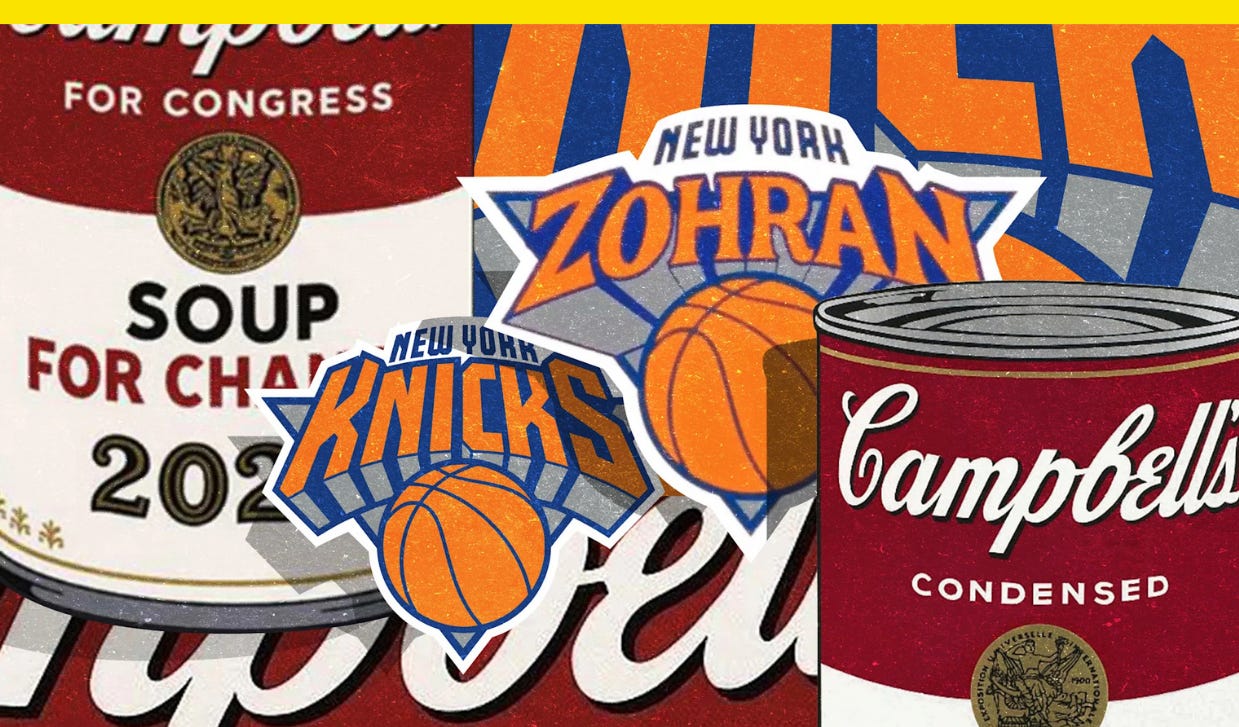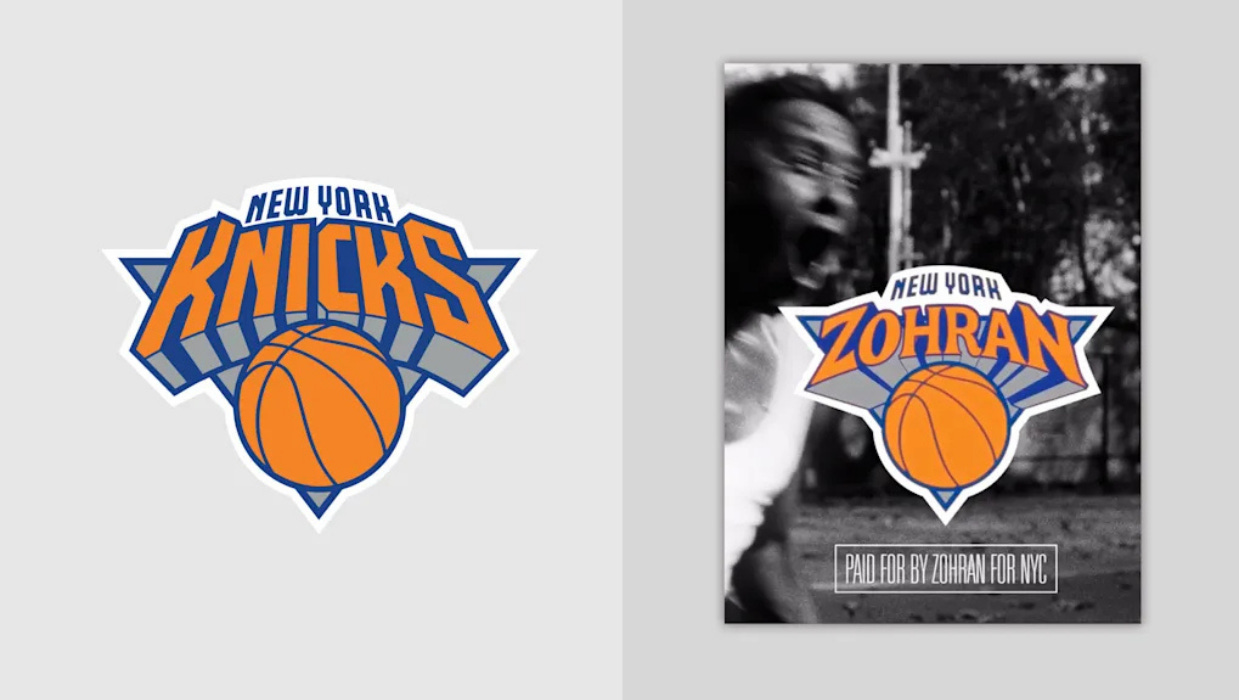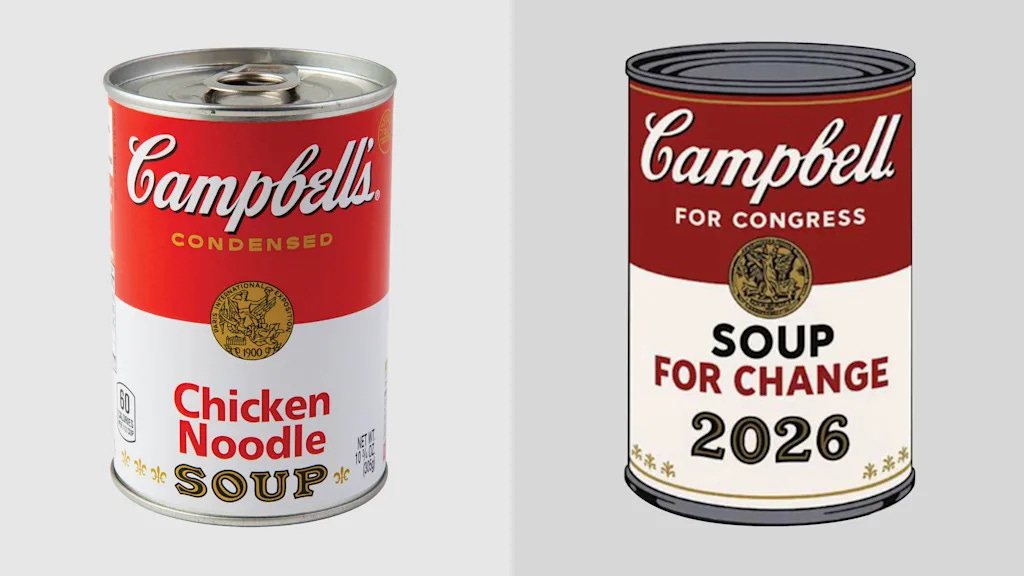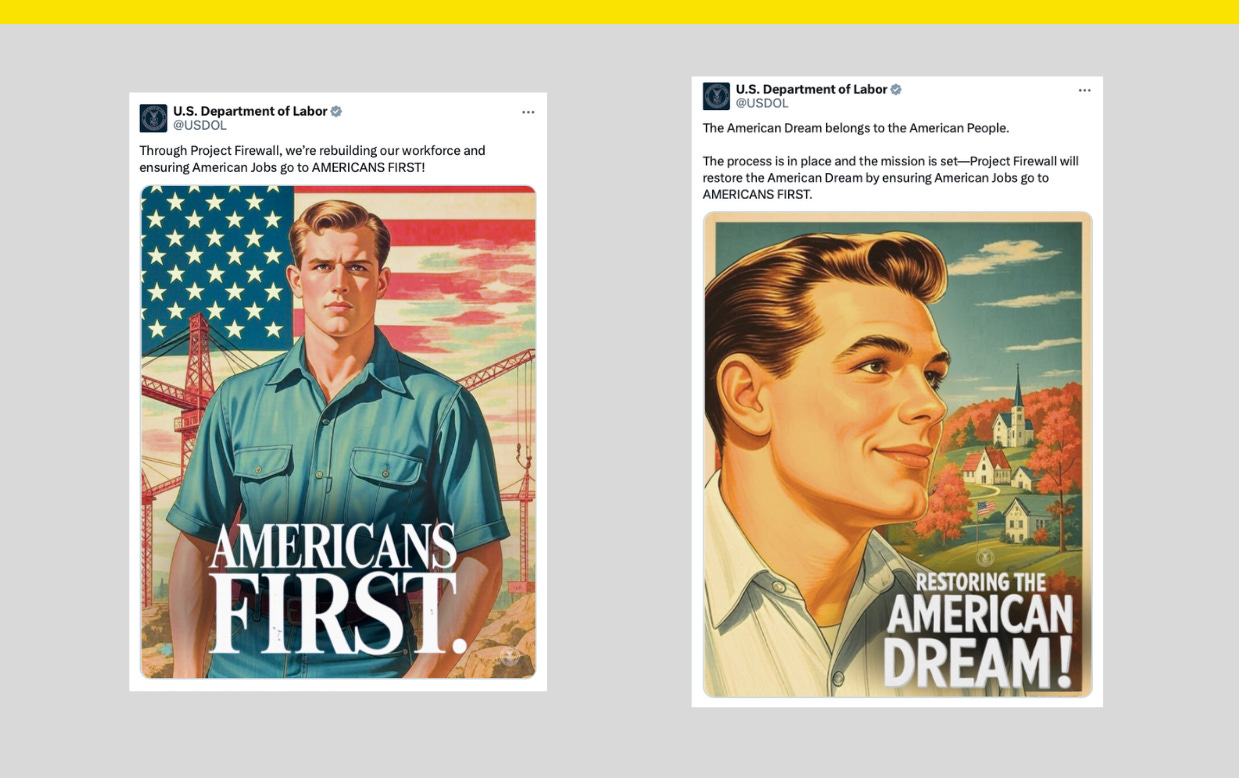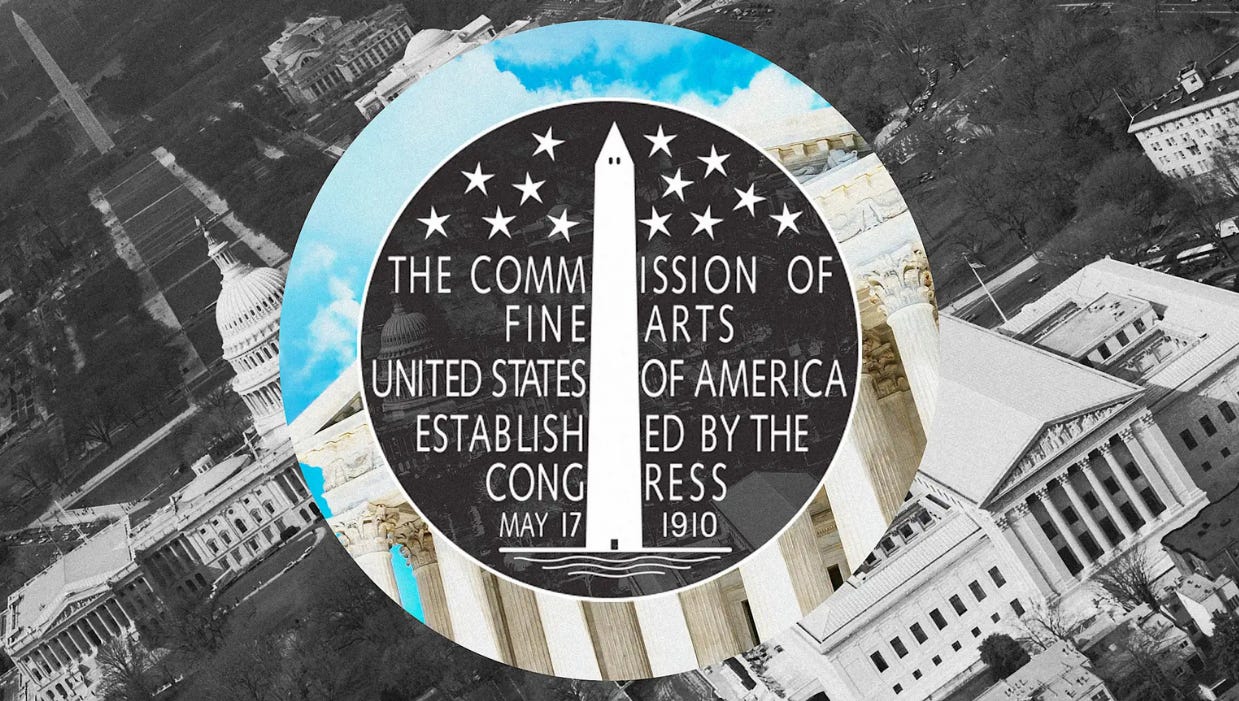Why campaigns rip off brand logos
Plus: Trump wants to ban these kinds of political ads
After Zohran Mamdani’s campaign aired a commercial that used a New York Knicks-style campaign logo with “Zohran” displayed atop an image of a basketball, the NBA team asked the New York City mayoral candidate’s team to take it down.
The Mamdani ad, which was broadcast during the Knicks’s opening game last week, shows black-and-white footage of a pickup basketball game in a park as the narrator says, “New York, this is our year.” There are shots of Mamdani campaigning interspersed with the pickup game, and the narrator says, “Things can be different. Hope is back,” before the Knicks-style logo flashes on the screen over the sound of drums.
The Knicks, whose owner donated last year to Mayor Eric Adams, weren’t happy with the knockoff logo and sent a cease-and-desist letter to the Mamdani campaign asking them to knock it off, according to the New York Post, which first reported the letter. The campaign says it will comply and pulled the ads on Friday.
The Mamdani campaign said it was adjusting the ad, and “while the Knicks might not be able to publicly support our campaign, we’re proud to publicly support our NY Knicks,” campaign spokesperson Dora Pekec said in a statement.
But it’s not the first campaign to lean on the visual tropes of a beloved brand to attempt to say something about hometown pride or a candidate’s values in a single image.
In 2022, Tim Short, a Republican state legislative candidate from Georgia, used a logo designed to look like the Fox News logo, searchlights and all, but the searchlights were later taken off without explanation. That same year, Matt Jenkins, a Democrat and U.S. House candidate in New Jersey, was hit with a cease-and-desist letter from Wawa, after the convenience store chain noticed the similarities between the birds in his campaign’s logo and theirs.
Jenkins said in a social media post at the time that the design was intentional. “For a lot of people in our district, Wawa represents them. When we launched this race to replace Chris Smith, I wanted our logo to feel instantly familiar,” he wrote.
And that’s what these knockoff logos are meant to signal. By leaning in on a familiar logo, they visually convey that a candidate is “one of us,” as if to say: This candidate is a Knicks/Fox News/Wawa/[enter brand name here] fan, just like you.
Brands, though, are quick to distance themselves. After a U.S. House candidate in Michigan named Shelby Campbell refused to comply with a cease-and-desist letter from the Campbell’s Company over the Democratic candidate’s logo that was designed to look like one of its soup cans, the company filed suit this month.
Claiming her actions “are not innocent parody but are designed to capitalize on Campbell’s iconic brand and associate one of the country’s most famous and enduring brands with her political campaign,” the company said her rip-off logo confused customers.
While campaigns can’t use knockoff logos without inviting potential legal action, that doesn’t mean some won’t try. By designing logos based on popular brands, campaigns hope some of that brand magic will rub off at the ballot box.
But would-be copycats, take note: While Mamdani, with his own distinctive campaign logo, may well be an exception, other recent candidates who’ve used major brand logos haven’t fared as well. In Georgia, Short’s short-lived Fox News logo didn’t help him win the Republican primary. Jenkins rebranded to a bird-less logo and lost.
Sometimes it’s better to come up with your own idea.
This story first appeared in Fast Compay.
Yikes! The Labor Department’s new posters draw comparisons to propaganda
The images promote the department’s “Project Firewall.”
To promote its new program combatting H-1B visa fraud and encouraging employers to prioritize American workers, the U.S. Department of Labor, or DOL, is posting images on social media criticized for looking like authoritarian propaganda.
Images shared this month by the agency on X promoting its “Project Firewall” show all white men and families. Some are actual captioned works of art, like Harold Anderson’s “Family at church,” and others have the yellow tint associated with A.I.-generated images (The agency was caught using an A.I. image on its website earlier this year. So much for “hire American.”). Another image is a repurposed U.S. Savings Bonds poster from World War II.
It’s nothing new for the DOL. Since a July post of an image of Trump that says “America is Hot!,” the agency has posted some 20 of these propaganda-style images that appear to be A.I., and the gender and racial imbalance of their artificial world doesn’t match the actual diversity of the American workforce. The same department also gave us taxpayer-funded banners of Trump’s face to were displayed on federal buildings this summer that looked like something out of Pyongyang.
The Atlanta Journal-Constitution opinion section called the images posted on the DOL account “Norman Rockwell meets Josef Stalin. There’s a real old-timey Soviet-style feel here, which the MAGA brainchilds who dreamed it up would dispute. Remember, anyone they disagree with are called ‘socialists.’” The Bulwark compared the style to “Heroic Realism” Nazi propaganda and noted the blue-collar jobs depicted in the DOL’s posts don’t match the actual tech and information sector work the agency claims to be combatting with Project Firewall.
Trump wants to ban these kinds of political ads
Trump said he wants to ban “fake” polls in ads. Fake polls are a real problem, just not the way he thinks.
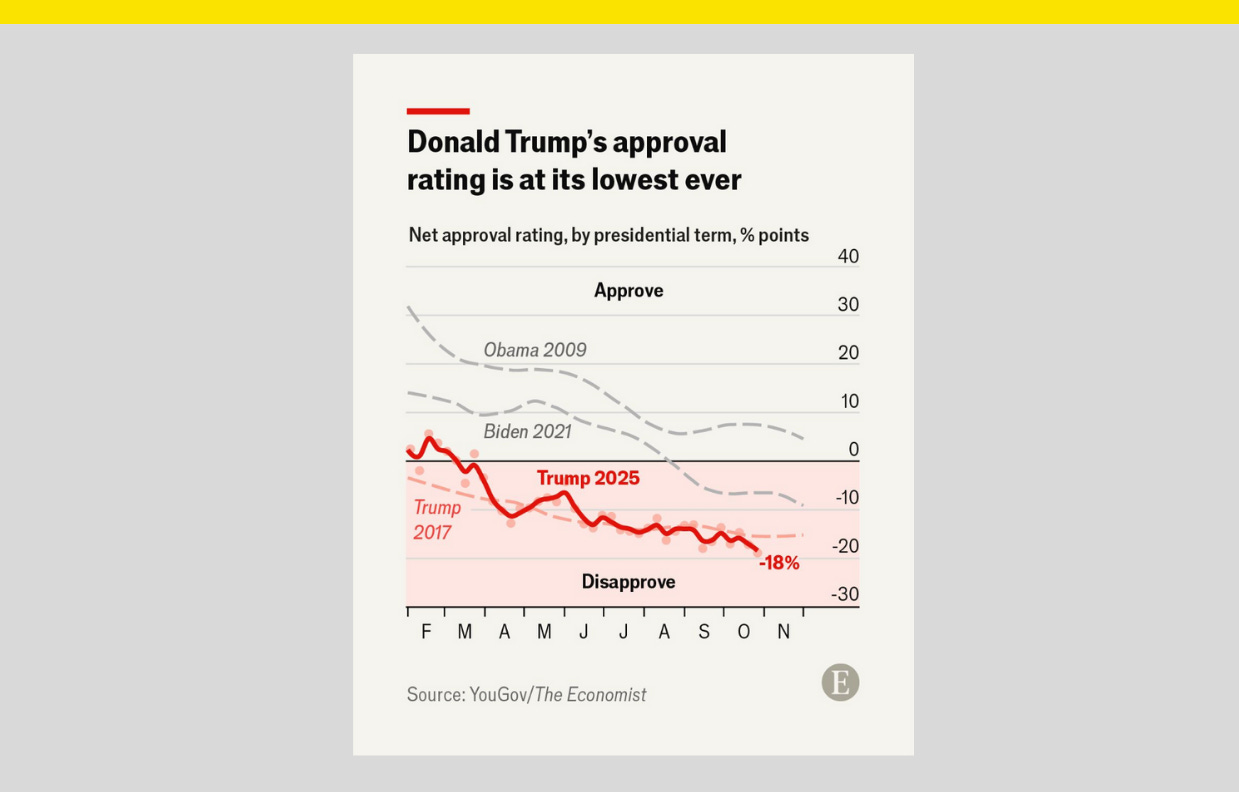
New polling this week from YouGov and The Economist found Trump’s approval in his second term has fallen faster than his first term and both of his recent predecessors. If Trump had his way, that fact could be illegal to advertise.
In a post this week on his social network, Trump falsely claimed he won three elections (he famously won only two) and that he’s getting the best polling numbers he’s ever gotten (his second-term approval is hovering near its lowest point at 43%, with a 54% disapproval, per The New York Times average of polls). Then he called for a “fake” poll ad ban.
Trump wrote that “the Radical Left Losers are taking fake ads, not showing REAL Polls, but rather saying that I’m Polling at low levels.” He added, “These ads should not be allowed to run because they are FAKE!” Trump didn’t indicate what ads or polls he was referring to.
As a divisive, unpopular president, Trump is a deeply unsympathetic figure to be making an argument about “fake” polls. But fake polls really are an issue, just not in the way Trump says. Polls don’t always get everything right, of course, but media organizations that put out polling have an incentive to be accurate because credibility is their business. For betting markets, though, fake polls can mean a quick payday for bad actors.
When the Commodities and Futures Trading Commission sought to stop trading on congressional races last year on Kalshi, a betting market that named Donald Trump Jr. a strategic advisor in January, regulators warned that fake polls have already been used to manipulate other prediction markets before.
The commission cited a fake 2017 poll put out by a shady group that set up its website just a few weeks prior to its supposed poll showing Kid Rock leading then-Sen. Debbie Stabenow (D-Mich.) in a hypothetical matchup that affected prices on a trading platform. They also cited a 2012 bet on Mitt Romney worth millions meant to make the presidential election look closer than it was. “Manipulation has happened, and is likely to recur,” regulators wrote.
Have you seen this?
Trump just fired everyone on the U.S. Commission of Fine Arts board. What now? Here’s a breakdown of what the CFA does, who was on the board, and what happens next. [Fast Company]
Republicans spending $5 million to slam House Democrats over political violence. American Action Network is behind the campaign. It’s an early preview of the themes Republicans will focus on in the midterm election as they look to define the country’s problems and put Democrats on the defensive. [Axios]
Meta fights $35 million penalty over Washington state’s political ad law. Lower courts found the social media giant violated the state’s campaign finance law 822 times, but Meta appeared before the state’s highest court on Tuesday to argue that the rules are unconstitutional. [Courthouse News Service]


